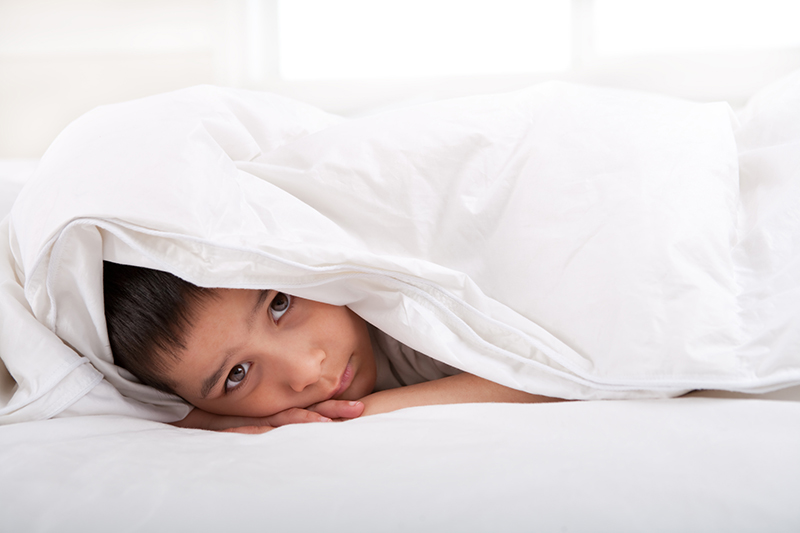Families For Life | Sleep Problems: Children with Autism Spectrum Disorder

DID YOU KNOW?
Many children and teenagers with autism spectrum disorder (ASD) stim and might keep stimming throughout their lives. They use stimming to manipulate their environment to produce stimulation, or because they have trouble with imagination and creativity and can’t think of other things to do, like pretend play.
READ MORE

Many babies and children have settling and sleep problems. In children with autism spectrum disorder (ASD), these problems can be more severe than in other children. You can manage and overcome many sleep problems in your child with ASD using common behaviour strategies.
Autism spectrum disorder and sleep
Like all children, children with autism spectrum disorder (ASD) can have trouble getting to sleep and staying asleep.
Children with ASD can also have sleep problems that we don’t see as often in other children. These difficulties include:
irregular sleeping and waking patterns – for example, lying awake until very late or waking very early in the morning
sleeping much less than expected for their age, or being awake for more than an hour during the night
getting up and playing or making noise for one or more hours during the night
excessive sleepiness during the day.
Sometimes sleep problems last for a long time in children with ASD. Other times they improve as children get older.
Sometimes he wakes up too early and can’t settle. Because he needs reassurance, he wakes the household.
– Parent of a child with ASD
Why children with autism spectrum disorder have trouble sleeping
Communication difficulties
Many young children with ASD have trouble communicating their wants and needs to others. Your child might be kept awake by something he needs but can’t ask for. Also, because of their communication difficulties, children with ASD sometimes can’t pick up on cues that it’s nearly bedtime.
Love of routine and bedtime habits
Children with ASD can be very attached to their routines and rituals. Your child might settle well if the regular bedtime routine is followed, but not otherwise. Also, children with ASD can get into the habit of falling asleep in a particular place, and they won’t settle anywhere else. Habits like these can be difficult to break for children with ASD.
Favourite objects and associations
Children with ASD might have favourite bedtime objects or favourite pajamas they need to wear before they’ll settle. Without these objects and associations, some children with ASD can’t settle.
Other reasons: anxiety, hyperactivity, medical issues and medication
Children with ASD can have a lot of anxiety. This can make it hard for them to get to sleep, or get back to sleep after waking.
Also, children with ASD sometimes have hyperactivity and can stay very active and alert right into the evening.
And like all children, children with ASD can suffer from illnesses – colds or ear infections – that make it hard for them to settle or sleep well. Chronic illnesses like asthma or epilepsy can also affect children’s sleep.
Some children with ASD take medications that can have side effects that include settling and sleep problems.
If you’re having trouble working out why your child is having sleep problems, try keeping a sleep diary. By writing down your child’s sleep behaviour, you might start to see a pattern, or notice something in the environment that could be affecting your child’s sleep. This record of your child’s sleep behaviour will also be useful for any professionals working with you and your child.
Managing autism spectrum disorder sleep problems
Settling and sleep problems in children with ASD aren’t always part of having ASD. Some sleep problems are behaviour issues you can manage using strategies you’d use for any other child.
That said, your child with ASD might have difficulty understanding what you want her to do, and accepting any changes that you make. Dealing with your child’s sleep problems might need lots of time and patience on your part.
Here are some strategies for managing settling and night-waking problems.
Sleep routines and habits
Develop a positive bedtime routine that involves your child going through a few pleasurable activities in the 20 minutes or so before bed. You can use this routine wherever you and your child happen to be.
Set a regular, age-appropriate bedtime for your child. It should be when you know your child will be sleepy, but not overtired. Many parents of children with ASD say that regular bedtimes and wake times help with their children’s sleep problems.
Make sure you give your child plenty of warning that bedtime is approaching. If your child doesn’t like to change activities with little warning, he might get upset if you suddenly decide it’s time for bed.
Be consistent in how you warn your child that bedtime is approaching. You could use a cue like a clock or an appropriate picture to show your child it’s nearly bedtime. Choose something you can use or do wherever you are, including when you’re on holidays or at someone else’s house.
If your child gets upset and gets out of bed, quietly and calmly put her back to bed. You might need to do this many times, especially if you’re trying to develop a new bedtime routine. Many parents of children with ASD say that returning their child to bed helps when dealing with sleep problems.
Sleep environment
If your child won’t fall asleep without a particular object – for example, a toy, special pajamas or pillows – try to think of ways to vary this. You might need to phase out the item, perhaps by gradually using different items at bedtime. This might stop your child from relying on just one.
Encourage your child to fall asleep in his own bed – not on the couch, in your bed or anywhere else. It’s also important for him to learn to fall asleep by himself. You might need cues to help your child understand that he needs to fall asleep in his bed by himself. These could be things like a picture showing him asleep in bed and you watching TV in another room.
If your child experiences anxiety about going to bed or sleeping alone, you could try wrapping your child in a blanket, using a nightlight in the bedroom, or playing music in her room when she’s in bed.
Other factors
If your child has been ill, he might keep wanting the extra attention he got when he was sick. When your child is better, try the settling strategies above again. But consult your child’s doctor if you think your child’s poor sleep is related to a medical problem – for example, asthma or epilepsy.
And if your child wakes during the night, calls out or gets out of bed, try the settling strategies above.
Other autism spectrum disorder sleep issues
Night terrors and nightmares
Sometimes children wake up screaming or crying. This could be caused by night terrors, which are normal in children from around 18 months to 6 years. Nightmares can also wake children up and make it hard for them to get back to sleep. Talk to your child’s doctor if you’re concerned or your child’s behaviour seems severe.
Bedwetting and toileting
Late toilet training and difficulties with toilet training are common in children with ASD. If your child isn’t dry at night, she might wake because she’s wetting the bed. Or she might wake to go to the toilet and then won’t go back to bed.
You might consider getting some help if toilet training and bedwetting are problems for your child. For example, you could start by talking with your child’s early intervention workers. If there’s a persistent problem, you could also talk to your child’s GP.
Snoring
Like all children, some children with ASD snore. If your child’s snoring is persistent and not associated with a cold or similar illness, consult your child’s doctor. Snoring can sometimes be a sign of sleep apnoea.
Restless sleep
Children with ASD sometimes have more restless sleep than other children. In particular, they might be prone to body-rocking, head-rolling and head-banging. Although quite common, restless sleep can also be a sign of some less common sleep disorders. It’s best to consult your child’s doctor if you’re concerned or your child doesn’t respond to settling strategies like those above.
Children with ASD who don’t sleep well are more likely to have behaviour problems during the day. As with all children, persistent sleep problems can negatively affect the learning abilities of children with ASD. And when children with ASD don’t sleep well, their parents are likely to experience poor sleep, lots of stress and depression. Improving your child’s sleep habits can help you avoid some of these issues.
Getting help for children with autism spectrum disorder and sleep problems
Sleep problems often start to get better after the first 2-3 nights of using settling tips like those above. If you don’t see any improvement, there might be medical reasons for your child’s sleep problems.
You might need the support of a professional to use some of the strategies above, like the strategies based on gradually changing bedtime and wake time.
You should consult your health professional if the strategies you try don’t seem to help after the first few days. You might be referred to a paediatrician, psychologist or other health professional experienced in treating children’s sleep.
What about medication?
Before trying medication, it’s best to try the behaviour solutions suggested above. But medication has been found to be helpful for some children with ASD.
For example, melatonin supplements help some children with ASD fall asleep faster. These supplements might also help children sleep for longer and/or wake up fewer times in the night. Melatonin might help improve daytime behaviour in some children with ASD, but the improved daytime behaviour might also be because children are sleeping better at night.
Only a doctor can prescribe melatonin. Your child shouldn’t take melatonin without medical advice and supervision.
© raisingchildren.net.au, translated and adapted with permission
Explore more